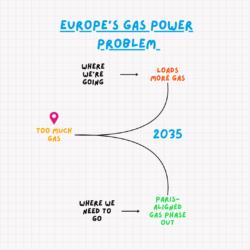15 November 2024
Europe’s Gas Power Plant Overbuild Undermines Climate Credibility
As European countries position themselves as global climate leaders at COP29, a new briefing from Beyond Fossil Fuels reveals a troubling overbuild of gas power plants across six EU nations—threatening to undermine their climate commitments and lock Europe into fossil fuel dependency for decades to come.
More Gas on Borrowed Time: Where Europe’s Climate Pledges and Gas Power Plans Collide examines the role of fossil gas in the power sectors of Italy, Germany, the UK, Romania, Bulgaria, and Poland. It details their current and planned gas power capacity, juxtaposing these with their climate targets. The findings are alarming.
Together, European countries plan to add 80 GW of new gas power capacity—a 32% increase from current levels. Italy, the UK, and Germany, which already account for 45% of Europe’s gas power, are responsible for half of these new additions, despite having committed to decarbonising their electricity sectors—by 2030 for the UK and by 2035 for Germany and Italy. Astoundingly, none of these countries have a clear plan to phase-out fossil gas at their 931 gas power units, much less the new ones under development.

In Central and Eastern Europe, Poland, Romania, and Bulgaria—already lagging on their coal phase-outs—are doubling down on fossil fuels as they prepare to collectively increase their gas plant capacity from 9 to 24 GW. Inexcusably, many of these projects are subsidised with taxpayer money, and/or financed through the EU’s Modernisation Fund and Recovery and Resilience Facility, which are intended to help countries “modernise” their power systems and make their economies more “sustainable”
The briefing also highlights a significant underinvestment in clean flexibility solutions, such as grids, storage, and demand-side response, which are essential for the functioning of a fully renewables-based power system. It calls on European countries to halt investments in gas power and redirect critical funds—including taxpayer subsidies and EU financing that currently provide a lifeline to gas plants—towards renewable energy, grids, storage, and flexibility solutions. Only by doing this can Europe truly clean up its power sector by 2035, as the IEA states is essential to meeting climate goals.
Download the briefing